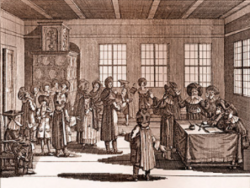Margvali

Margvali (Khamli: მრგვალი mrgvali) are Rasmi communities, which were historically self-governing, located primarily in Occidental Auressia, although they are present worldwide. They have ancient roots, first appearing in the Sabarine Empire soon after the destruction of Argetia and the Sabarine Exile. The Sabarines, and later polities, were often content to let the Rasmi govern themselves, operate their own secular and religious law, and self-segregate, in return for a special tax. This autonomous status was largely repealed in the 19th and 20th centuries, though in some countries Kazalege are permitted to handle cases of civic law for ethnic Rasmi.
Margvali can be urban or rural. In the former case they tend to be neighbourhoods of cities, or in cases where there are fewer Rasmi or they are a new community it can be dispersed across a wide area. When rural they tend to encompass entire villages, which are often solely or majority Rasmi. There is no distinction between either, though historically urban Margvali had access to better resources and wealth, with many rural Margvali often lacking a permanent kazalege or trained ela.
Etymology
The word margvali comes from the Khamli word referring to a circle, and it later became synonymous with the idea of a district, particularly a Rasmi inhabited one.
Institutions

One main institution of a Margvali is a kazalege (from Idrean casa di legge 'House of Law'), which acts as both a community centre, governing council, and arbiter of civic law and civil disputes. The kazalege is staffed by shemtse, who would be trained in secular law, both of the Rasmi and of their host country. They were usually empowered by states to oversee civic law and disputes if both parties were Rasmi. In some states they were respected enough to be integrated into the judicial system and also oversee civic and criminal law for Rasmi and non-Rasmi alike.
Aside from acting as courts, the kazalege also serve as fonts of judicial and communal knowledge. Shemtse are obligated to help any Rasmi in need of legal advice or support without charge, although a small donation is customary. Rasmi, and more rarely non-Rasmi, can apprentice at a kazalege for a preliminary legal education, with some larger kazalege being accredited to provide qualifications. Most also host a public and private library, the latter being accessed only upon request.
The last function of a kazalege is to serve as a public centre overseeing the community. The shemtse and givirgvini act together as a local council for the Margvali. They manage the budget which is supplied by both donations and a special voluntary tax. In some cases where the Margvali is particularly large and relatively homogenous, or is a small rural village composed solely of Rasmi, they can be empowered to act officially as a local parish or metropolitan council and receive more powers and responsibilities.
The other main institution of a Margvali is the Sasamartlo (სასამართლო), which is best described as a religious court. It is staffed by mosamartle, who are members of the regular clergy, and assisted by ela, who are members of the secular clergy. The sasamartlo oversees religious law exclusively, pertaining to things such as blasphemy, improper rituals, textual and interpretative disputes, clerical disputes, status of the ela, etc. There are various types of sasamartlo, but most Margvali will have either a temi (თემი 'community) or patara (პატარა 'small') sasamartlo. Some of the larger Margvali may have a maghali (მაღალი 'high') sasamartlo, while smaller village or neighbourhood Margvali may lack a permanent sasamartlo and have to request the nearest sasamartlo send a mosamartle, or travel to it, if any disputes arise.
Leadership
The leader of a Margvali is called a givirgvini (Khamli: გვირგვინი gvirgvini, lit. 'crown'). The givirgini is in charge of running the Kazalege and overseeing the community. While their position is often considered synonymous with that of a mayor or head of a local council, it also overlapped with the duties of a magistrate.
A givirgvini is selected by the Shemtseebi, those who work at a kazalege, and is then confirmed in a public hearing at which all members of a Margvali may attend and vote at. At this hearing, known as a darekva, the nominee will give a short speech, and then the shemtseebi will give their opinion on whether they think the candidate should be confirmed or not. It is rare for a candidate givirgvini to be rejected, but if this is the case the shemtseebi reconvene and select a new candidate. Often the shemtseebi select one of their own, usually the seniormost, but this is not required.
The shemtseebi (singular. shemtse) members of the community who work at a kazalege. While they are best known for acting as civic judges and providing legal advice to the community, they also act as a local council and oversee the Margvali's budget, taxation, projects, and community gatherings. They are often confused by non-Rasmi with Mosamartleebi due to both primarily being involved with legal activities. The main difference is that a shemtse works in civil law and procedures, while a mosamartle focuses on religious law and canon.
A shemtse is acknowledged as such after they have completed a three year training period at a kazalege and have been approved unanimously by the other shemtseebi. Historically only men were eligible for such training, although now it is estimated around 20% of shemtseebi are women. While most shemtseebi are also practicing ela, this is not a requirement for the role.
Society
Notes
მრგვალი (mrgvali) - circle, district
გვირგვინი (gvirgvini) - literally 'crown', refers to leader of a mrgvali
(კაზა ლეგე) (kazalege) - House of Law, from !Italian casa di legge, not to be confused with სასამართლო (sasamartlo), a religious court


